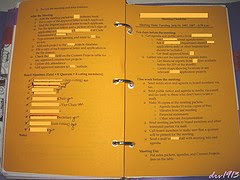
NOW THAT WE'RE ALL STARTING TO REFOCUS IN EARNEST after the New Year holiday, here's a question for you:
If you could change one dynamic about your cultural organization’s board in 2010, what would it be?
Would it be something major, like a change of board leadership? Or some small tweak to what you already do that could have a big impact over the course of the year?
Whether your board elections are right around the corner or months away, it's always a good time to talk about the leadership needs of your organization. Seems to me that the first quarter of the year is as good a time as any to take stock of the coming year's challenges and determine the organization's resources to meet them, including leadership skills. It may be that certain challenges will be best handled by committee members or junior staff, rather than the board president, a committee chair or the director. What needs to happen to allow everyone to "own" a leadership role in your institution?
Thinking of tweaking instead? Here's a thought: what difference would it make if you were to call a couple of board members every month for a one-on-one chat about the organization? Could be just an update; could be seeking advice; could be posing a question for which there may not be an answer (at least not a ready one).
Or what about using a consent agenda to open up time at your board meeting to talk about current and future issues or challenges? Or developing a dashboard of really useful metrics that can help board and staff track mission impact?
Photo: Meeting Checklists from drv1913
drv1913 writes: One part of my job is to coordinate monthly, public meetings for three boards of directors. Each board serves a different purpose, and there is a LOT of work that goes into getting ready for each meeting and a LOT of work to be done after each meeting. I created detailed checklists for each board so that I remember everything that needs to be done. These also come in handy on the rare occasion that someone needs to cover for me.
Here is the second sheet for one board and the first sheet of another. I print off the next month's checklist after each meeting and use those to jot down that next month's agenda items throughout the month.


Comments